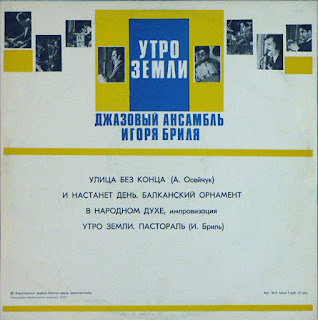Recently my ipod classic crashed-- I still use that antique electronic device due to its huge storage capacity, resulting in flacs being my bane-- from one day to the next the hard drive failed, and apparently after going to several repairmen, I found out the data is unrecoverable though I was willing to spend a lot on the process. So after replacing the HD I had the task of reconstituting years of music and playlists, many albums whittled down to one favourite song, out of all the terabyte backups I had assembled over several different HDs. Luckily the blog stuff was kept separate so those albums were easy to access (kept for the tedious task of reupping dead links). Well it astounded me going back to 2013, 2014, what an immense quantity of great music was posted on these pages, literally hundreds of fantastic albums which often were completely unknown to humanity before (The
Exceptions, for ex.). And I'm not being boastful here because I say it only to give credit to the many people who have contributed (willing or not) to this costly labour of love. It's true that sometimes when I've run out of material to post I go back to the oldest HDs to see what treasures I discovered elsewhere from others that I've enjoyed immensely, and this album is an example of exactly that.
To give full credit first of all to the helpers there's the uber Tom Hayes (
Genre Commercial Success, Ginga Rale Band), and the amazing and mighty osurec (so many,
Bob Bath Band,
Sailor Band,
Natural Life, etc.), but then there are all the over the world-dispersed friends who are willing to collect so many records to find the one pearl out of hundreds of ugly oysters, and I never can believe they are willing to do it-- I have a budget of 2-300 dollars a month at most beyond which I don't let myself go, for the sake of my family and children, and that's sometimes only one or two LPs when it comes to Italian library. Then there are the requests from commentators which turned out shockingly good (
Michel Herr, Simon and Bard), and the discographies that had to be completed to discover beautiful gems (
Orexis,
Capon and Escoude come to mind), then there are random discoveries that shocked me
(Xavier Genet,
Gerard Pisani). In fact, checking back to 2013 to titles I completely forgot about, I knew that if my heart jumped to see a name or album cover, there was music that I treasured like a jewel back then (
Bertha and Friends) and then promptly forgot about with the niagara waterfall of new stuff to listen to every day to the present time.
All I can do is to thank those people who helped me, many of whom fell aside on the way for understandable reasons, usually because (real) life got in the way, because the financial penalty was too great, the exhaustion built up too much to ignore, or simply they resented the fact that I've dedicated so much to being publicly accessible, since very few want their records to be shared with anybody anywhere (many of whom then turn around and claim the rip as their own on their own blogs for example, without credit). There is so much time to be taken up with researching records which might be good, buying them, ripping then, scanning the art, compared to a few seconds of downloading a file... But it's worth the trouble, at least for me. Recently I got a post on the
Gold Night Ride album from the wife of the composer, Bob Wamnes, thanking me for comments about his genius. That's why I call it a labour of love. And as George Benson said,
as long as there's a song to be sung, my heart will be younger than spring...
Information on this record can be found
here. The magnificent complex composition closing it out called
Prelude:
I'm reminded of two of my favourite old American 'Jazz with Strings albums,' Freddie Hubbard's The Love Connection (1979), and Wynton Marsalis's Hot House Flowers (1984). Of course, I've said before the Americans were never able to organically conjoin the classical tradition with jazz as well as the Europeans did, to my utter shock when the era of internet music sharing began after napster in the 2000s, because until then I grew up with Miles Davis and Sketches of Spain as the template for the best true 'fusion' music. When my Swedish friend sent me the
Finnforest CD (through the original napster program, way back when) I fell out of my chair when I realized how much superior this was. God bless Shawn Fanning.)
On the former album, the track called
"This Dream" by
Claus Ogerman featuring his typical intelligence mixed with delicatesse, is one of my all-time favourites.
His album with Akkerman which comprises reinterpretations of classics is also highly recommended.
More to come from Gurbeloshvili, and the former soviets...


















































